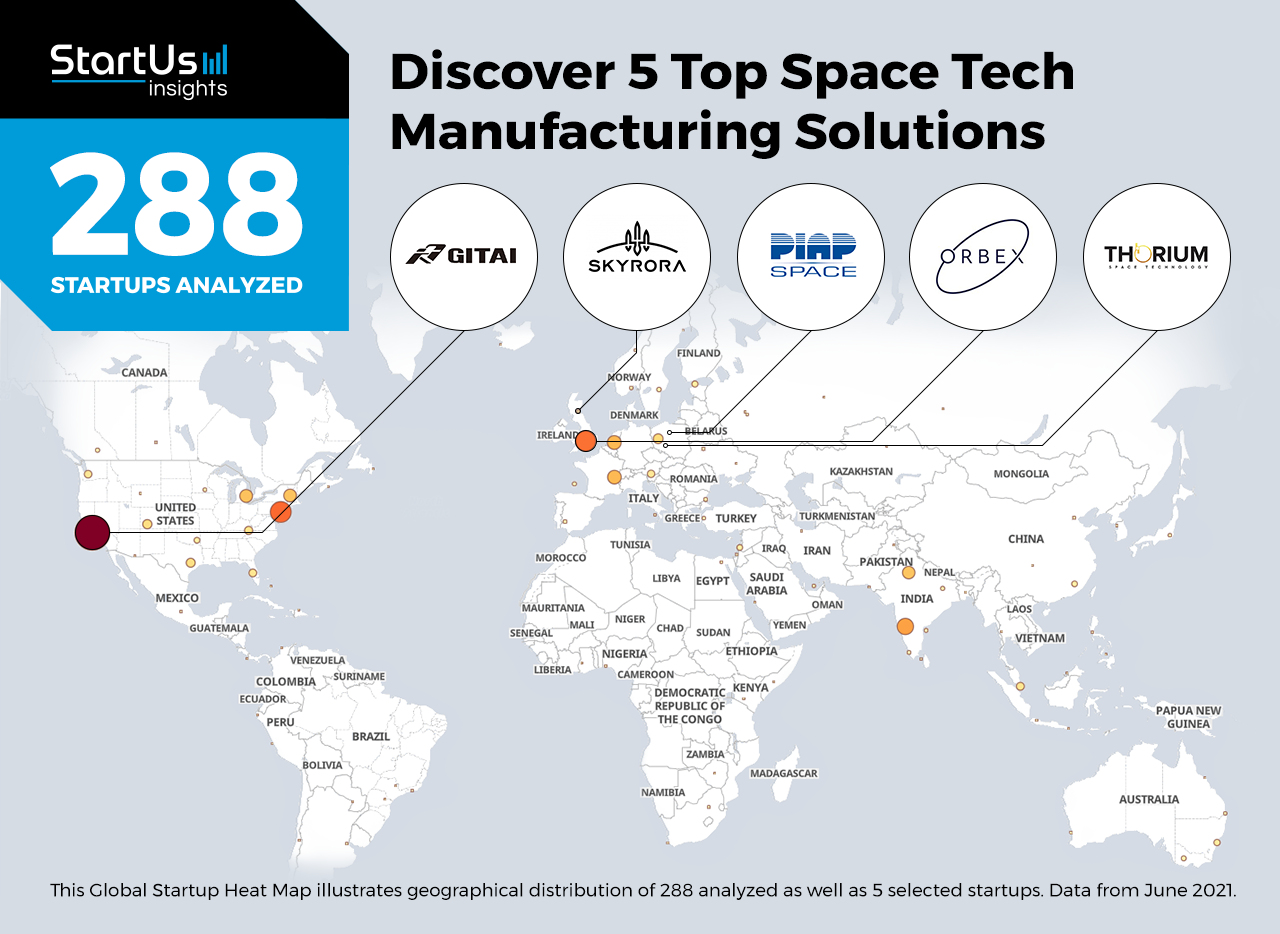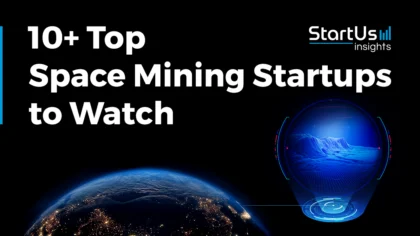Accelerate Productivity in 2025
Reignite Growth Despite the Global Slowdown
Staying ahead of the technology curve means strengthening your competitive advantage. That is why we give you data-driven innovation insights into the space industry. This time, you get to discover 5 hand-picked space tech manufacturing solutions.
Global Startup Heat Map highlights 5 Top Space Tech Manufacturing Solutions out of 288
The insights of this data-driven analysis are derived from the Big Data & Artificial Intelligence-powered StartUs Insights Discovery Platform, covering 2.093.000+ startups & scaleups globally. The platform gives you an exhaustive overview of emerging technologies & relevant startups within a specific field in just a few clicks.
The Global Startup Heat Map below reveals the distribution of the 288 exemplary startups & scaleups we analyzed for this research. Further, it highlights 5 manufacturing startups that we hand-picked based on criteria such as founding year, location, funding raised, and more. You get to explore the solutions of these 5 startups & scaleups in this report. For insights on the other 283 space tech manufacturing solutions, get in touch.
Thorium Space Technology develops an Ultra-Flat Antenna
Advances in space communication are powered by sensors, receivers, and high-quality transponders. SpaceTech startups develop antennas for communication that do not create interference due to the Earth’s atmosphere. Lesser interference also ensures that the antenna catches signals more efficiently. This facilitates the manufacturing of high-performance and high-capacity satellite systems. Therefore, space companies rely on antennas with a higher frequency to avoid any intervention of other frequencies and ions in the atmosphere.
Polish startup Thorium Space Technology develops an ultra-flat active-matrix antenna. This antenna, along with transponders, uses high radio frequencies of E and K/Ka bands. As a result of such a high frequency, there is relatively low interference from the earth or space. Moreover, the solution increases overall throughput and system capacity when compared to existing antenna solutions. The company’s antenna also follows the guidelines of the International Telecommunication Union (ITU).
PIAP Space creates Robotic Subsystems
Space missions require extensive inspection, coordination, planning, and development techniques. Even slight errors are enough for space organizations to rack up costs and missions to fail. Owing to the increasing complexities of these missions, space startups develop human-assisted robotics and automation to eliminate the risk of errors. These robotic systems avoid the repetition of mundane tasks for humans, as well as save time and increase productivity for the space industry.
Polish startup PIAP Space manufactures orbital robotic subsystems for space. The company specializes in developing technologies for refueling, assembly, active debris removal, and integration purposes. For example, its Titan project uses a robotic arm for satellite servicing and deorbiting old satellites. The robotic arm will eventually remove space debris to improve the safety of satellites. PIAP also offers grippers, torque, and force sensors that assist satellite maintenance and servicing.
Gitai builds Robots for Space Station and Extraplanetary Missions
Space robotics fixes technical glitches on space stations. For example, they allow solar panels to always face the sun, carry heavy objects and also deliver supplies from unmanned spacecraft. Therefore, space startups develop robotic solutions, in particular robotic arms, to assist space explorers in carrying out mechanical tasks and lift large objects in space.
US-based startup Gitai develops robotic systems that enable automation of both internal and external tasks on space stations. The startup offers G1, a general purpose robot that enables automation for lunar base development. Their S1 robot services the in-orbit satellites. Another product, H1, offers a cockpit manipulation system to monitor space-based robots from earth. The robots are also capable of manipulating switches, tools, and conducting experiments in space.
Orbex manufactures Launch Vehicles and Satellites using Additive Manufacturing
Because of the rising demand for accuracy and automation in the space industry, many space startups rely on 3D printing to develop satellites, payloads, and launch vehicles. This saves a lot of time for space engineers and scientists as the production time is considerably faster. For example, complex designs for payloads and engines are created through computer-aided models and later printed using additive manufacturing techniques.
UK-based startup Orbex uses 3D printing techniques and advanced materials, such as carbon fiber and graphene, to manufacture engines, tanks, Low-Earth Orbit (LEO) launch vehicles, and miniaturized satellites. The company manufactures the entire propulsion subsystem using additive manufacturing. For instance, the engine is 3D printed as a single piece and is customizable according to client requirements. The engine is also lightweight and uses eco-friendly low-carbon fuel made of bio-propane. This, in turn, significantly reduces carbon emissions when compared to conventional hydrocarbon fuel.
Skyrora works on Plastic Waste-derived Fuel
With large amounts of waste piling up in many countries as well as our orbit, space startups are looking for energy solutions that are clean and renewable. Some of the solutions include upcycling plastic waste into fuel for launch vehicles. This also reduces the carbon footprint and waste accumulation on earth, hence, preserving the environment in the longer run.
British startup Skyrora develops suborbital launch vehicles including Skylark Nano, Skylark Micro, SkyHy, Skylark-L, and Skyrora XL for small satellites. The vehicles are powered by Ecosene, a renewable and low-cost fuel made from non-recyclable plastic waste. The startup is capable of processing various types of plastic waste like Polypropylene, Polystyrene, High-Density Polyethylene, and Low-Density Polyethylene. The vehicle’s fuel is made through catalytic pyrolysis and refining, exhibiting better energy characteristics than kerosene.
Discover more Space Startups
Space startups such as the examples highlighted in this report focus on smart propulsion, LEO satellites as well as space mining. While all of these technologies play a major role in advancing the space industry, they only represent the tip of the iceberg. To explore more space technologies, simply get in touch to let us look into your areas of interest. For a more general overview, you can download one of our free Industry Innovation Reports to save your time and improve strategic decision-making.








